The original conversation with Sarmīte Cīrule, a theologian, historian, and Latvian nurse who is the first foreign sergeant in the Ukrainian army and the chief medical officer of the volunteer battalion Karpatska Sich, was published on this website at the very end of 2023. At that time, Sarmīte Cīrule had been nominated and then named European of the Year in Latvia. Now, with the war intensifying again, we are publishing the translated version of this interview and ask you to hold our sisters and brothers in Ukraine in your prayers.
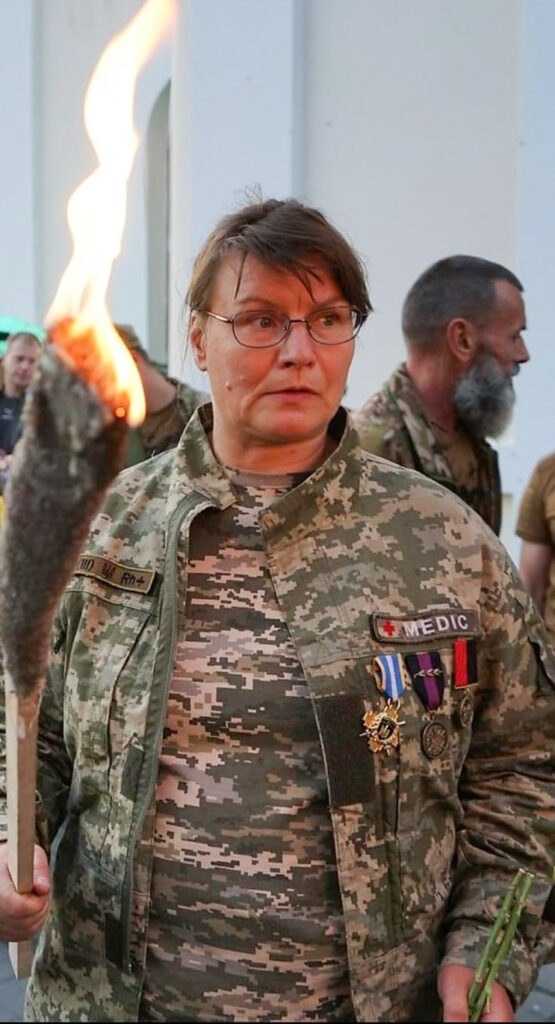
Where has this call reached you?
You have called me to the battlefront. Today is busy as usual. Of course, there are days when it is calmer. At the moment, I am waiting for a guy who is conctused and has just been brought back from the trenches. It will be necessary to treat him. We can talk safely now, but when he comes, we will have to pause our conversation.
How long have you been at the front? You yourself needed treatment for a while, didn’t you?
I came to Ukraine on September 24, 2022, and have been at the front since October 16, 2022. I have been injured and contused several times. The first situation was on December 30, 2022, and something like that cannot be forgotten. The other injuries were milder, but I had to receive treatment anyway.
What is your daily life like? One cannot be ready for everything one has to face, right?
Every day is completely unpredictable, but in that unpredictability, there is also order. If I am on the evacuation vehicles, then nothing can be predicted—first of all, whether you will stay alive. There are also airstrikes here at the base, but it is a bit more predictable. I don’t know how the day will develop, but there is a conscious routine and order to keep If you recognize this as the right place to be, it means all this can be done. It is more problematic if a person does something for certain goals, like financial goals, proving something to oneself or the world, or due to ambitions. There are different guys and girls here, and their reasons for being at the front vary. I have a clear conscience. I don’t have to prove anything to anyone. Rather, it is a matter of conscience about what Putin is doing, and one should try to help the Ukrainians. Of course, the other aspect is my faith in the Holy Trinity. War is the place where you can best see who a person is and what they believe. There are no tricks here.
Was it obvious that you would go to the front? How did you get to where you are now?
My first decision was already made in 2014 when the war started. I was working on a ship at the time as a doctor. To work on land, I would have to retrain, but I didn’t. Now my life is more related to theology and history, but medicine has always been in the background, and I don’t want to lose it. It was natural, there were no questions, and those who know me did not ask if I would go, but when I would go. I wanted to go as a medic, but we weren’t allowed back then, in 2014. Legislation did not permit it. I tried to send humanitarian aid, but now with the full escalation, I am here.
In the first months, it was not clear whether the war would come to Latvia as well. But since it continues in Ukraine, it was necessary to arrange a way to get there. At the beginning, I couldn’t go yet, because at that time I was working in a hospital in Riga in the COVID department. And that experience was invaluable training for me.
I have worked in different countries around the world. One of my training experiences was while working on a ship, where we had various scenarios that formed the basis of what to do and how to survive in critical situations. Of course, being in a real war is different, but still, the foundational skills were already there.
What is your life path, God’s call, and encouragement? How has your life been?
I come from a completely unbelieving family. God was never spoken of. I am a child of Soviet times. When the perestroika years came and the churches opened, people flocked to them, and humanitarian aid was brought in. I come from the countryside and studied at Aloja, Auseklis High School, where I saw members of the Soviet Communist Party running around with red flags. During the years of renewal of the Latvian state, those same old women and men with red flags switched to red-white-red flags [the Latvian flag] and ran to church. I thought it was terrible hypocrisy. At that time I was 14-15 years old and growing up fast.
At the age of 11, the father of my younger sisters passed away. From a very young age, I was taught to understand and read people in order to survive. As a small child, I did not like hypocrisy or lying. I wondered what kind of church would tolerate such behavior. I saw people scrambling to collect humanitarian aid with the biggest bags ever and then going to church to proclaim their faith in God!
There was a woman who practiced spells and divination, who also told me about God, but I proudly said that I would never kneel before God, that I would never pray to Him. I found it very humiliating. I did not believe in fairy tales. I was a small adult with a very serious attitude towards life.
I was probably in the 7th grade or later and had a classmate, she was a pioneer, but she was different. She did not make fun of other children. While the rest of us raged, argued, and lashed out at each other, she never did. She was reserved and kind-hearted, completely different. At one point, she started telling me about God and Jesus. I didn’t understand much, but something changed in my heart. And it changed precisely because of her. I thought, maybe there is something to this! That night I went home, stood in my room, and said, “God, my friend Ramona says you exist, but I don’t believe you. If you are real, show me so I know you are there!” The sky did not open, there were no lightning bolts, and a booming voice did not proclaim, “I am God!” But something happened in my heart, and something changed. Although I am pragmatic, I was also a very sensitive child, experiencing deep emotions—crying, rejoicing, sympathizing. I even had an insect graveyard in the countryside.
A friend gave me books and a children’s Bible. I remember washing my hands and placing those books on the bed. I knelt beside them, feeling they were something holy and special, and that I was not worthy to even sit next to them and read. I truly believed; my heart was seized, but I said to God, “Listen, there is terrible hypocrisy. I will not go to church.” And I didn’t go. Later, after various, including tragic events in my life, I prayed and was prayed for, and then I could clearly see that it was God who had guided everything in my life.
At the age of 16, I moved to Riga. I studied highschool at evening school and worked at “Vīķi” centre as a nurse, aspiring to study nursing. I attended different churches. One of the significant ones was the Riga International Church, where I truly felt the love of Jesus. There, people noticed my needs. For instance, when they saw I didn’t have winter boots and my shoes were torn, they simply said, “Let’s go to the market. I’ll buy you shoes.” In that church, I truly experienced God’s love and human love as it should be. That was a time of a growth for me.
I was also involved in the charismatic movement and still consider myself part of it. I preached and graduated from YWAM Discipleship School and worked there until 2004. Later, I moved to Ireland and lived there.
Your life story shows that you see Christianity as a verb, as actions, and not a noun?
Of course, of course! Actually, if you ask how life is now, then I would say it’s kind of a closed circle now. I learned medicine first, but Christianity has always been alongside everything. There have been all kinds of struggles and questions for God, and it hasn’t always been pretty and rosy. I speak openly with God and always say honestly how I feel. All kinds of words have been sent to God from my mouth. If someone would tell me that it is disrespectful to speak like that to God, I would say, well, I’m sorry, we each have our own relationship and understanding! God is not the one who condemns and God sees clearly who and what we are like.
Then I went to study theology because, I believe, academic knowledge is necessary. Later, I studied history. Medicine, theology, and history are what I need, and that combination, everything that has shaped me in life, has prepared me to be here now, it is a full and complete circle.
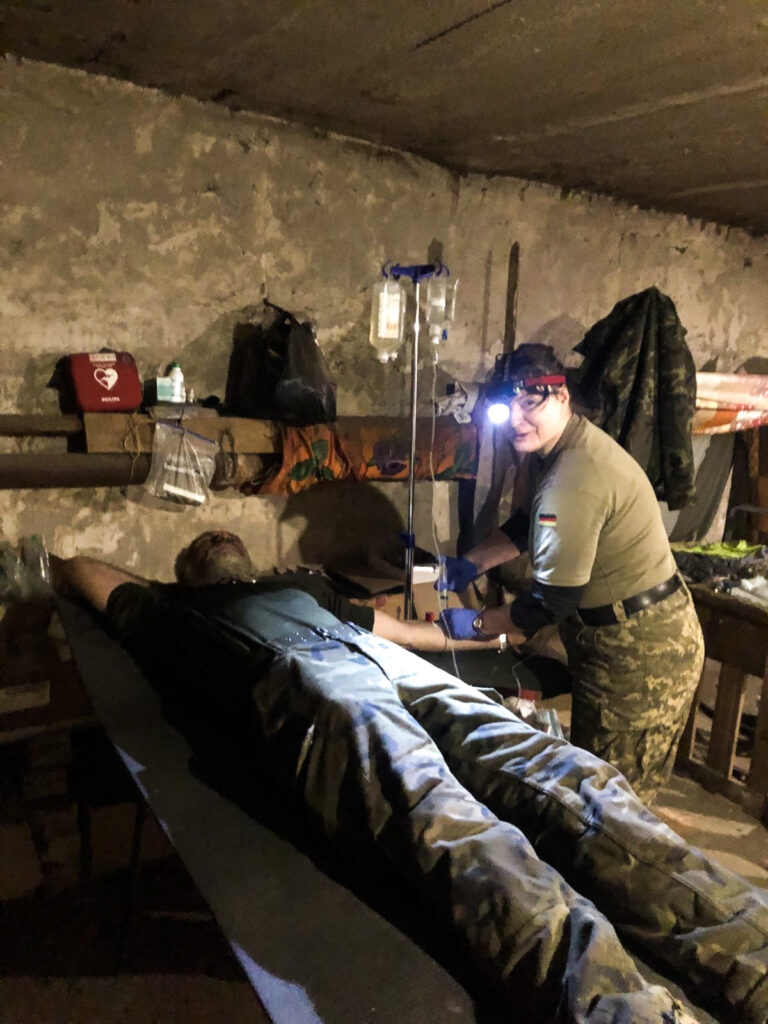
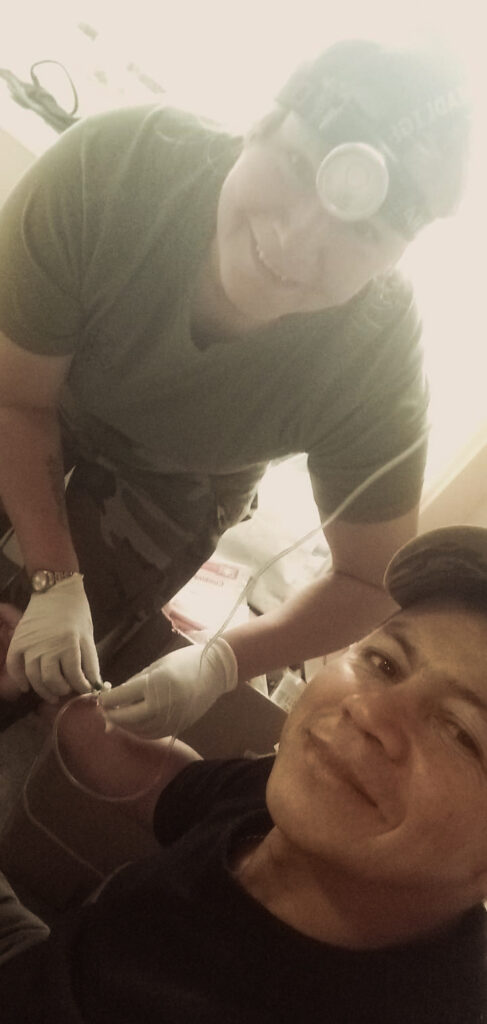
When you encounter wounded soldiers, often at a critical point in their lives, are you visited by fundamental, existential questions about life and death? Do you think about injustice and enemies? What are the categories in which you think when faced with the fragility of life?
At a critical moment, I do not think about the existence of God. At that moment, I am focused on keeping the soldier alive, stopping the bleeding, and getting him to where he needs to be as quickly as possible. The existential questions arise when we are back at the base and when the soldiers are angry. There are different soldiers here, and especially the Ukrainians have a sense of injustice and anger. I also sometimes feel anger, but not the kind that destroys, rather the kind that propels me forward. I have already confronted my existential questions throughout my life, especially while working in medicine. The biggest questions arose while working in the COVID department. For almost two years, I worked beyond my strength, often encountering despair and questioning how it could be that out of four people in the ward, all at about the same age, two would die. All four had a chance to survive and at the same time none of them did. In the very beginning, people were simply mowed down like grass. You can say fate, God’s will, but I don’t know.
Do you see God’s presence in everything?
No! (laughs) I often see Satan’s presence! On December 23, 2022, we brought a seriously wounded soldier and a completely unconscious one. I yelled at the driver, “Drive faster, drive faster!” He replied, “I’m already driving!” I can’t even remember if I prayed to God. I just wished we could stay alive. After that, I prayed and gave thanks. There have been times when the evacuation vehicles were being shot at, and I’m standing in the doorway of a shed, saying, “God, I’m ready. I’m ready to go.” But I think He [God] would not be happy if I went there because then I would bring order up there (laughs)! It is better for Him that I am here.
What is it like to live near death? How has your relationship with death changed?
The saddest thing about death is that I will never see that person again. They say there are no irreplaceable people, but that is utter nonsense. A person cannot be replaced. We had a commander who was injured, and his absence was deeply felt. There are specific people who can do specific things, and their loss is profound. As a Christian, sometimes I feel like enough is enough with all the horrors of this earth. I have faced various tragic circumstances and existential questions, often crying out, “I can’t anymore, I want to be home with You, God!” I have cried my soul out. But then I hear, “Sarmīte, but you can do this and that and that.” If I were killed, I would be angry and ask God, why did you do that, why did you allow me to be killed? There are many things that each of us can do and can no longer do when life ends. During COVID, the attitude toward death was sometimes dismissive – well, what’s the matter, just an old person died! But wait, that old person could have lived longer. Yes, they had illnesses and problems, but they could still live. That old person is someone’s grandmother, someone’s mother or father or grandpa. Every person can make a contribution.
For example, my father has died, and I have no one to turn to. I would definitely like to ask my father something, and he would have taught me something, but he is not there. And there is pain in knowing that a person is no more. Maybe some works are left undone. My dad and mom made love and that’s why I am here. I am their testament, but I miss the living person I can ask questions and relate to. I can only pray to God. I don’t know where my father is—in heaven or elsewhere. I can pray to God for my father and say that I hope he is all right, that he is with God. And to say, “God, then you must be my father!” In matters of death, for example yesterday, I thank and praise and I say to God, “Who else can I turn to but you, O God in all the evil surrounding me?”
God has given us all kinds of talents. God certainly knows what kind of character we have, and that is why we can do something specific. We are not created to live for a specific purpose, but I want to believe that I am in this world because, being specifically me, I can do something special and perhaps cannot do something else.
While I was in the hospital, my battalion chief medic said, “We’re glad you’re back because only you can deal with the Colombians!” (laughs) And it helps. Instead of remaining conceited and proud – “See how they can’t do without me!” – I have the awareness of why I have to be here. God has entrusted it to me.
When I drive to the trenches, I try to pray. Silently I also prayed for the Ukrainians. For myself I have support groups who stand with me, including Ukrainians who are deeply rooted in Christ. I know they won’t just say that they will pray for me, no, they will actually do it. I have Christians and non-Christians in my support group, and I don’t have to explain anything; they just understand that is is hard and they pray. I then write down what happened and it can be a reference point and an encouragement for them.
In the conditions of war, do you see that people think about God more, perhaps you see that there is anger and questions about God’s whereabouts in all this?
Those who have been active in their faith, those who live out their faith, are sad. For Colombians, when one of their friends dies, we cry together, we worship God together, and we love each other. You don’t need much.
Ukrainians are more angry because it is their land. I have never felt this question in me—why does God allow this? I know that some guys have said to me, “Sorry, I don’t believe in God, never have, and I’m an atheist.” I say if you’re an atheist, you should still believe in God (laughs).
What does it mean to you that you are noticed and appreciated?
The interesting thing is that I usually don’t know anything about such things unless someone accidentally tells me. For example, now that I have been nominated for European Person of the Year in Latvia [Sarmīte received this award at the end of 2023, after this interview], I didn’t know anything about it. An acquaintance I hadn’t spoken to in years congratulated me. She was already congratulating me on the award. I said, “What award?” She had misunderstood, thinking there was already a prize. Last year, I was the “Medic of the Year,” which was a big surprise for me, but thank you all for appreciating my work.
You know, I just calmly came and served, did my job, and helped. I try not to read comments on social networks, but sometimes I do. For example, people say that I came to earn money. I don’t earn money; financially, I am actually in minuses when it comes to the hours and work I do. By doing my work in Latvia, I would earn more. The expenses here are very high, and I am one of those people who invest in my group as well. If I didn’t have any money, I wouldn’t be able to help myself or the group.
When people ask me, “Sarmīte, what should I send you?” I say I don’t need anything. Of course, there are things that cannot be bought in Ukraine, and how often do I go to the store here? There have been periods when I have not been able to leave this area for almost half a year. I have the base and evacuation vehicles. I leave to take someone injured, and there is no time for shopping. Even the stores that are there have only certain things.
I humbly do my job, and what is there to brag about? It is already nice that there is recognition, because the sacrifice is still being made. To serve is a choice, and to serve is also to work beyond your strength and capabilities. I feel I can make such a sacrifice.
When I was in the hospital, I talked to the doctor, and we became friends and continued to correspond. One of my paramedics was killed; he fell in battle. I told the commander, “That’s all, I’m going to the trenches,” but he didn’t allow it and said that my task is here, that my war is here. “You are the main combat medic of the section, and your duty is here.” Then, when I was wounded, 140 soldiers were left without a medic. This is very serious. Yes, and the doctor with whom I spoke, I asked him, “But why is my life more important than the life of the Ukrainian guy who has just died?” He told me simply and calmly, “You are here, your life must be saved, so that you can then tell the world about the horrors that are happening here. This is your value—you come, you see, you work, you serve, you help us, and you can tell the world about those horrors afterwards.”
Through this, I have become much more tolerant towards journalists. Recognition in Latvia is growing, and there are other support groups here as well. It happens that they want to send something specifically addressed to me, because they trust that whatever little or how much they donated will distributed fairly, and that is so. It will neither be traded nor misused. So, on the one hand, thank you for appreciating and recognizing me, because in this way you can help Ukraine more. It’s not because I am an earthen vessel that can be used.
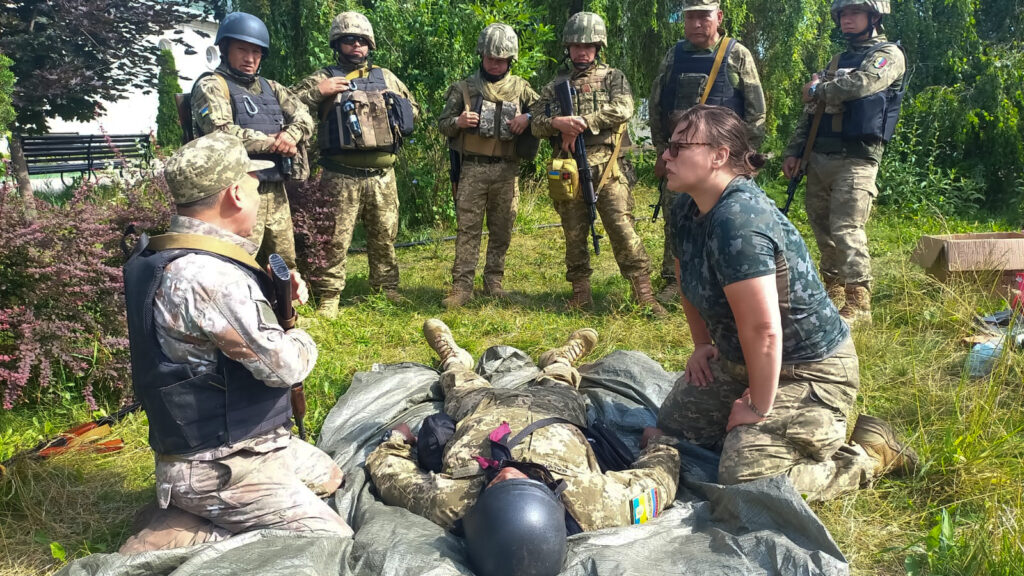
You mentioned that you can be a witness who will be able to tell about the horrors of the war—are you thinking about the end of the war, about what you will tell people? And what should we think and hear now?
There must be a military tribunal. Criminals – whether they have been Ukrainians who have cooperated with the Russian Federation or the Russian Federation as a state – must be punished because the war must end. And it would be good if it had already ended yesterday. The sacrifices made by Ukraine are great.
For example, today I administered treatment to a soldier and gave him the necessary paperwork for the hospital or civilian life afterward. He said, “I don’t need that form because I will be killed.” He is a very good soldier and is aware of the dangers, aware of trenches, battles, and logistics, and how quickly in reality it is possible to help and act. He said that just for their post, 20 kamikaze drones flew over, followed by all the other artillery.
I would like to talk and knock on doors of influential people in Europe about the supply of weapons because Ukraine must win. If Ukraine doesn’t win, other dark powers like Iran, North Korea, and China might be encouraged to attack. Russia will not stop with Ukraine; as heirs of the USSR, we know well what Russia’s policy is.
If there are tribunals, I will be very happy to talk about war crimes. This is simply terrible, a complete madness – we are in 21st century, yet humanity hasn’t progressed much despite all the wars we’ve had. Some people think – well, it doesn’t affect me, it is somewhere far away in Ukraine. They remain comfortable in their homes, with their cars, apartments, houses, and vacations. Due to the war, there is a huge increase in prices worldwide, and the era of cheap living is over. The common people suffer most because of it. To say it doesn’t affect us is a bitter delusion because it affects everyone. It is also a matter of conscience.
When the war ends, we will need to start thinking about forgiveness and reconciliation. We will have to find new ways to build bridges and think about how to be neighbors. What do you think about this as a theologian?
I am not a diplomat or a diplomatic person. When I see injustice, I’m not the kind of person to make amends, because I am not a person of compromise. In my opinion, compromise does not work because one or both sides remain losers; it is like walking on slippery ice.
For forgiveness, there must be a very great love of God because it cannot be done humanly. It is possible for me because my family is not here, my home is not here, my homeland is not here. It is different for me – I can say I forgive. I can say – God, I forgive them. It is much easier for me, but even then, it is very difficult. The heart hurts and feels like it will jump out of the chest; sometimes there are such emotions. But you cannot dwell on it.
What do you do to avoid falling into despair?
When you can’t take it emotionally, you have to go home. Everybody hurts. A wonderful soldier has just died. I go into the office of the commanders and see the pain in them, but they will not show that it hurts because they are the commanders. The soldiers and I can all sit and cry, and the men cry too. Their hearts cry out in pain. It is still difficult to show emotions in post-Soviet thinking, but Colombians, Argentines, Spaniards—they have been taught to show emotions and they cry freely. It is easier for them; there is less bitterness. But I also have soldiers who say that they practically have no more emotions—they have no fear, sometimes with a sense of doom. The person who has the Holy Trinity in their soul is different.
How do you personally experience the Holy Trinity at this time?
I experience the power of the Holy Spirit. In the holy blood of Jesus Christ, I am protected and washed. God, my Father and Lord, is my protector. God is my rock. That is the Holy Trinity. If you experience that power, then that’s where life flows. Nothing is separable in the Holy Trinity, and it is neither something dry nor unattainable nor ostentatious.
Do you experience that power every day, and does it allow you to move forward?
No, not every day has that kind of energy. I have a very normal relationship with God. I am alive, and there is life in me. Strength and life, yes, but I also have fatigue. Then, I go to sleep at night, pray, and admit, “I can’t anymore,” and then strength comes from somewhere. Often, there is no wisdom on what to do, and I say, “Please help, God, I need wisdom!” And suddenly, something in my brain opens, and wisdom appears (laughs).
And then you go from one such moment to the next?
Yes. I see little tiny things, and those little tiny things make me happy. Many small things make big things (joyfully).
What made you happy today?
I examined a soldier who was wounded and had a concussion. He called and called frantically on the walkie-talkie yesterday, and no one answered. In desperation, he said, “Is anyone here at all?” I said to him, “Yes, I hear you!” He came to my office, weeped, and thanked me. I told him that I had the feeling he was like Jesus in the desert calling. He said, “No, you were like God to me. Thank you for responding.” He cried, and I had tears. We both had tears, and joy and comfort. It gives great strength to go further. Simple humanity gives strength – to be human and remain human in tragic circumstances. Sometimes I swear and shout because I can’t do otherwise. (laughs). Then I say, “Oh, God, I’m sorry, but I had to!” (laughs)
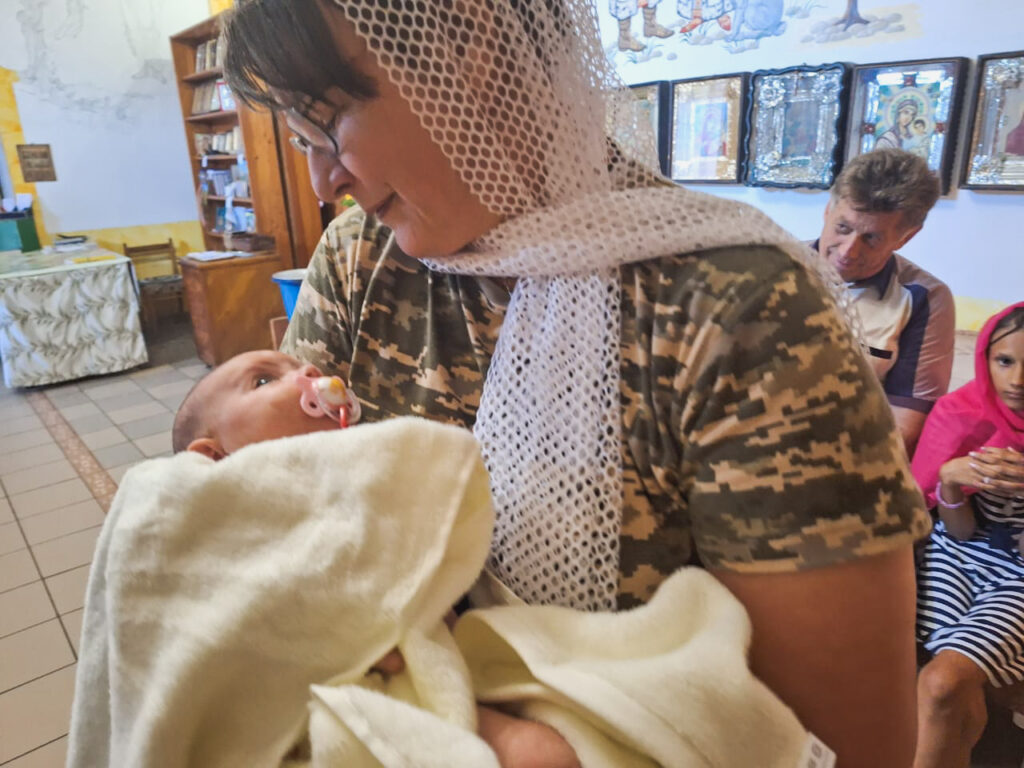
What are your duties and responsibilities towards the soldiers? Do you also provide spiritual support to those you are next to, not just healing wounded bodies?
It has happened that I go to the commander and see that he is in a moment of weakness. Then I understand that I can’t get anything from him. Sometimes people turn to me, but I have no one to turn to. It is good that I have a support group in Latvia—family, good friends. You have to look at whom to tell what, and who it is better not to tell. With soldiers, I am like a mother because there are very young guys here, aged 23-25. One soldier says to me, “Oh, mom!” I say, “What kind of mother am I to you?” He says, “My mom is 10 years younger than you!” (laughs) I’m like: “Okay, okay!”
I am also responsible for the quality of the food and ensuring they do not freeze. That’s why I always tell people to ship hand and foot warmers when they enquire, because we run out of them very quickly. I look after 150 people. Of course, there are also civilians and soldiers from other companies and battalions who visit me. There is still cooperation at the battalion level. I am very popular! (laughs) And when they see me, they don’t turn their heads and don’t run away! There are soldiers who must sleep, rest, and do what I have told them. If they haven’t, they are the ones who avoid me! I can see who has taken medicine and who says nothing helps them. After some time, I manage to visit them and see their house full of medicines! Then they silently lower their eyes. I say, “Next time you’ll get a spanking from me!” (laughs) He says: “Ok, understood!” There are all kinds! Sometimes they don’t trust me, thinking, “What do you even understand, being a woman?” But after a while they recognize and say, “Oh, well, yes, she really does understand things!” (laughs)
Everyday life and many situations tend to be hard and dark. What is it that keeps you happy?
There are also bright days. It is not every day that there are injured people. It is not every day that people are killed. A soldier comes with an injury, and I tell him, “But look, you only have a splinter in your leg. Your leg is not torn off. There is only a splinter, and that is very good! Given the situation you were in, this is very good.” He looks on life with new eyes after that.
The temperament of life that I have, even while working in medicine, is not artificial optimism but an evaluation of risk situations and awareness of what could have happened and what actually happened. I have had shaking hands and feet after certain situations. I often think about how we were blown up. I don’t know how we survived. Also, when we were driving fast with an evacuation vehicle, artillery was fired at us, the entire vehicle shook, but it didn’t hit us.
I was on vacation and stayed at a local Pentecostal church. They had a place like a small hotel next to the church – a bedroom, kitchenette, reception room. I stayed there and didn’t even go to the bistro because there are locals who inform on us, and then suddenly there are explosions in cafes. A soldier goes to a store, someone reports, and then the store is targeted. I want to stay alive and not take unnecessary risks. If it’s possible to avoid danger, I’m happy to avoid it – that’s risk management. I try to walk around in body armor and a helmet whenever possible to save my life. Not because I think I’m going to be killed, but because I could do something, and I need to be there. The responsibility is great, and responsibility also gives strength and joy. That’s just who I am.
Are you planning to return to Latvia?
I can go to Latvia at any time, but my responsibility here is great. The battalion commander says, “Sammy, we can’t even imagine our company without you.” I have been here for quite some time, and I have grown attached to my role. In the beginning, it was very difficult for me and there were tears, and I thought, “What for?” Slowly, everything changed and became fine. I should come back to Latvia. I have to finish writing my master’s thesis, which I can do until January 31, 2025.
There is still time!
Well, yes! But I hope the war will be over by then.
May God grant that!
From your mouth to God’s ear! You know what gives me peace? The fact that Satan cannot be everywhere at the same time. His employees are everywhere, but he cannot be everywhere, and this gives great joy and well-being. But, God is omnipresent. And omniscient. Sometimes it’s a shame that He’s omniscient (laughs).
Various memories also bring me joy. Estonians and Latvians organized mobile saunas. Mobile sauna for cars, washing machine, shower. We have raids, and I’m in the sauna, lying on my back. Those raids are terrible! I’m lying there naked, and I think if they target that sauna now, I’ll fly up in the air naked with all those hot stones. That would be quite a sight! And from time to time, I remember those thoughts, and laughter just comes.
Once jets flew overhead, and I didn’t know if they were Russians or Ukrainians. It all happens so fast. You hold your breath, your mouth hangs open, and then you think, “Maybe put on a helmet?” But the helmet doesn’t come right away. If it is an aerial bomb, then where will you go with your helmet! Then I thought, “If they were Russians, they would first fire a missile and then fly over.” So, I guess they were Ukrainians. It turned out to be two Ukrainian jets. I was shaking; it was terrible. I thought, “That’s it; it’s my last moments.” At that moment, I could only hold my breath and my mouth just hung open. I sat frozen, unable to think. Every now and then, I remember, and I sit and laugh. Especially in desperate moments. Maybe it’s a defense mechanism of the psyche. When there is something tragic, the funny comes to mind.
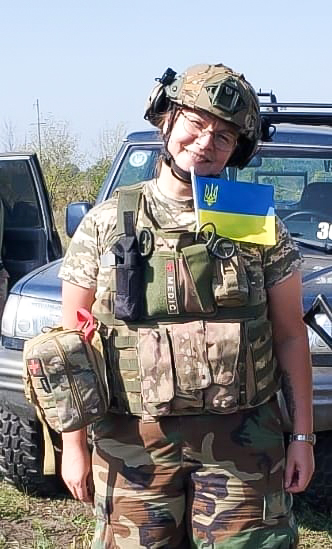
You have to be ready for virtually anything?
Yes, it is so. The mindset must always be prepared, and there is little room for relaxation. I am often on edge, as everyone has their own challenges. Each person has their own talents and place to operate, and we must make the most of what we’ve been given. Therefore, it becomes easier to navigate.
What do you want to say to those of us who are sitting quietly in the comfort of our homes?
Stay there! Enjoy the comfort of your home, seriously! I have no objection; however, please pray for us! Offer your prayers. Evil cannot last forever. There have been many times when a grenade did not explode, and we survived. I don’t know how we survived because that house is no longer standing. When we were evacuated, I found myself in another reality, feeling relieved and euphoric because the explosion, just 3 meters from me, was terrifying. It is not something to joke about. I was sitting in the kitchen, and suddenly the wall was gone. When we were taken away, and after subsequent explosions, those houses were gone, but we are still alive. So, if you are comfortable, stay there, and if you can share from your comfort financially, then contribute or intercede. We need weapons, though organizing them is no longer the task of the ordinary person sitting at home. However, even in comfort, we need at least an understanding that we require weapons because the war cannot be resolved otherwise. Diplomatic solutions are sought, but how can one negotiate with Putin? As long as he holds both physical superiority in terms of weapons and manpower, only God Himself can intervene. If the head of the Russian Orthodox Church preaches in church that killing Ukrainians is a great blessing and that weapons come from God, then there must be a counterforce. We must pray! Back when I was with YWAM I noticed that Protestant churches were more about the talk than the walk. You can criticize Mother Teresa for her methods of caring for people, but I deeply miss that practicality. I miss the proactive approach of not only speaking about God’s love but also demonstrating it through action. Where there is poverty, there must be assistance! We cannot sit comfortably and merely talk without being able to operate a soup kitchen. For four years, I volunteered at the Catholic church in Riga with Mother Teresa’s sisters. I played the guitar, assisted in the soup kitchen, and as a nurse, I tended to wounds and sent people to the hospital. We organized performances and engaged in various activities. There were many street children and much poverty. It was there that life blossomed within me. One can preach about God’s love, the poor, and the rich, but it means nothing without practical service. Theory is essential, academic knowledge is needed, but there must be a practical component. In that sense, I view the war as a matter of conscience. I cannot ignore it. My friends know this about me, and it has earned me both enemies and good friends. If I witness injustice and falsehood, I will speak out. I will make sure you understand that!

